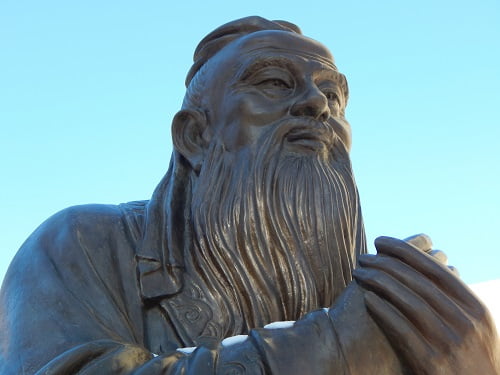撓場相關
2021.06.04

作者:李嗣涔教授
老子自己練功,知道有信息場(道)的存在,也在信息場建有網站是順理成章的事情,那孔子呢?
《論語》擁也篇第二十一,子曰:「務民之義,敬鬼神而遠之,可謂知矣。」述而篇第二十,子曰:「子不語:怪力亂神。」一般人認為孔子是不相信有鬼神的。因此當2000年八月我們手指識字實驗,第一次以「孔子」一詞測試T小姐時,她竟然看到異像,讓我們大為震驚。她在天眼中先看到了一個暗的人影,接著人影消失,然後「孔子」兩個字出現。異像出現的過程竟然與「老子」兩字實驗的結果完全一樣,此後百試不爽,一碰到「孔子」兩字都是先出現暗的人影,再出現「孔子」兩個字。原來孔子在信息場中也建立了網站,其在信息場的地位似乎與老子完全一樣。
我們再試了「孟子」與「莊子」,結果沒有產生任何異象,兩個字彙都直接被寫出來了,這表示亞聖就不行了。好像只有一個大門派的開創者才有足夠的力量在信息場創立網站。這到底是者麼一回事?是孔子自己也有修練到高境界而聯網?還是如心理學家榮格所聲稱的「集體無意識」所造成,中華民族對孔子兩千年的集體信仰與崇拜,在信息場塑造了一個網站出來?

孔子真的不信鬼神嗎?《論語》述而篇第三十三提到,有一次孔子生病,子路要替他祈禱,孔子反問:「你真的做了嗎?」子路說:「我是向上下各方的鬼神祈禱。」孔子就說:「那我早就在祈禱了。」顯然在孔子那個時代,生病是先要在上層的心性及信息層面下工夫,把不良的狀況調整過來就能治病,他們似乎是相信有一個形而上的世界存在。
孔子作繫辭傳有云:「形而上者謂之道,形而下者謂之器」,人體、器物、動植物屬於形而下的容器界,容器之上還有一個形而上的世界(道)。根據佛光大學宋光宇教授的新書《論語心解》,有更進一步的闡述。比如學《論語》都是由〈學而〉篇開始,但是要學什麼?是學當時僅有的詩經及書經?還是學「聖人之事」?依照傳統儒家的「內聖外王」理念,應該是學習聖人之事。內聖就是內心要像古代聖王一樣的有敏銳空靈的知覺能力,外王就是要用這知覺能力去覺察外在宇宙的運行原則,也就是「道」來治理國家。以現代的科學語言來說,儒家學習的方法是與信息場溝通,然後引天地的智慧來治理國家。
那麼「敬鬼神而遠之」、「子不語:怪力亂神」又是怎麼一回事呢?
論語各篇章節的安排像現代寫書一樣,上下都有邏輯的關係已表達完整的邏輯與故事,一句話必定會和上下文互相呼應,因此解釋一句話不能只看這句話的意義,而是要上下文一起看。很可惜的是當年我們讀高中時學中國文化基本教材例如論語孟子時,大多數都是單獨一句話、一句話解釋,結果誤解了論語真正的意思。「務民之義,敬鬼神而遠之,可謂知矣。」指的是把該做的事做好,尊敬鬼神但是又不完全依賴祂,保持個人思考空間,就是「知」,整句話不但沒有否定鬼神的存在,只是要不完全依賴祂。
「子不語:怪力亂神」則是和上文呼應:「我非生而知之者,好古,敏以求知。」孔子說他的特點:「我不是天生就懂那麼多事,而是在心性安定和空靈狀態下,敏銳的覺察各種事物及現象,才會知道這麼多的事。」像這樣訴諸安定心性作長時間觀察的事時,其實就是在靜坐,這時要特別的小心,不要妄言「怪力亂神」之事,否則容易走火入魔。是呼應上文的狀況下才需要不亂說怪力亂神,並沒有否定鬼神的存在。
原來孔子所教導我們的並不只有人間的王道,還有天人合一的學問,溝通信息場的學問。而且他似乎還能從信息場下載資訊,自然他在信息場擁有網站是水到渠成、理所當然的。
加入官方 LINE 收取最新消息